"At a reorganization meeting of the United Nations, a resolution was introduced, whereby these darkest days in the history of civilization will henceforth be designated as the Year Zero."
1. When you see a mushroom cloud, head in the opposite direction.
Granted, when you've gotten up at 4 in the morning to travel to your family campground for some fishing and fun with your grumpy adolescents, you may be a bit discombobulated after being irradiated with flashes brighter than the sun, but if there is a mushroom cloud over your mother-in-law's house, you are wasting valuable time traveling to see if she somehow survived the cataclysmic blast. While it's difficult to acknowledge that you cannot help your unfortunate loved ones, head of the family, Harry Baldwin, asserts that the focus should now be on the survival of the family unit.
 |
| Frisky Dad before he becomes Survival Dad. |
 |
| "Lightning? Hope it doesn't rain." |
 |
| That wasn't lightning. |
 |
| Random telephone booth in the middle of nowhere. |
 |
| "We've had it Dad, haven't we?" |
Harry: For the next few weeks, survival is gonna have to be on an individual basis. At the moment, we have to have food, a way to protect it, and a way to get more when it's gone.Ann: What do you want to do? Write off the rest of the world?Harry: When civilization gets civilized again, I'll rejoin.Ann: It's still here!Harry: Ann, you said civilization was still here. Well, keep your eye on it. Watch it unwind to a small, hard core. Then someone's gonna start putting it back together again and I want that someone to be us. Now is that wrong, is that immoral?
2. Stock up on essentials before price gouging and supply hoarding begins.
Catching shopkeepers unaware is your best bet to getting supplies at a reasonable price. Try to avoid involving your children in committing theft with the use of firearms. Should you come across a profiteer charging exorbitant gas prices, pay any additional costs with a knuckle sandwich delivered strongly to the jaw.
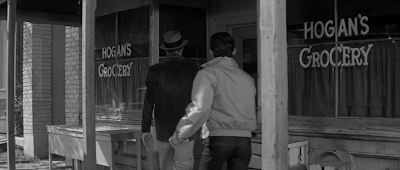 |
| "Our best plan is to find some small, out of the way market where they're not sure what's happened." |
 |
Grocery expenditures: $190.03 no liquids, no eggs (too hard to store) |
- 2 big bags of flour
- a couple pounds of baking soda
- a dozen pounds of coffee
- half a dozen jars of honey
- plenty of candy bars
- a big bag of dried beans
- canned fruit
- condensed milk
- big can of shortening
- matches
- 2 boxes of candles
- case of soap
 |
| "I owe you $200. I'll pay you when I can." |
 |
| While $3 a gallon for gas in 1962 seems cheap nowadays, it's equivalent to paying $27.88 a gallon by today's standards. |
Ann: I can't get over it. After all these years, I thought I knew you, but you turn out to be a stranger. Robbing and mauling people like some kind of a cheap hoodlum.Harry: We are fighting for our lives, Ann. The main highways are completely choked. They're spreading out on all the other roads. Every footpath will be crawling with men saying, no matter what, I'm going to live. That's what I'm saying too. My family must survive.Ann: Intelligent people don't just turn their backs on the rest of the world.Harry: Under these conditions, intelligent people will be the first to try.
3. Keep calm and don't drive crazy.
 |
| Don't be this guy. |
4. Don't let anyone stand in the way of your own survival.
When the path is blocked by others who are also willing to do anything to survive, you must remain fearless and determined, even if it means putting the lives of others at risk to keep your family alive.
 |
| "When I get going, fire a shot over their heads. Maybe that'll throw 'em off balance." |
 |
| Making a stop sign. |
 |
| Consequences of not heeding the stop sign. |
5. Assume a leadership role as soon as possible.
When your teenage daughter is whining about survivalism being a drag and a bore, tell her to shut her yap and get to work. When your wife questions your decisions, be sure to snap at her to make her stop. Now is not the time for your leadership to come into question. Hesitating to make a crucial but unpopular decision can result in dire consequences.
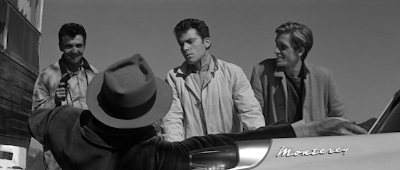 |
| The new highway patrol. |
 |
| "I oughta kill the bunch of you!" |
Harry: You almost missed him. What happened?
Rick: Well, Mother pushed the gun away.
Harry: You pushed the gun when he fired?!
Ann: He was gonna kill that boy!
Harry: That boy, as you call him, was gonna kill me. Then that boy was coming after you and Karen. Would that have suited you better?
Ann: I just couldn't let Rick...
Harry: Would you rather see one of us lying dead at your feet? Make up your mind!
6. Try to maintain some sense of normalcy.
If you were already prepared to shave, wear makeup and style your hair on your camping trip, then you should not allow a nuclear disaster to interfere with your regular routines and habits.
 |
| Grateful to be the one in charge. |
 |
| "I lived here. They killed my mother and father." |
 |
| Don't let traumatic events keep you from looking your best. |
 |
| Especially if Frankie Avalon is chopping wood in a tight T-shirt. |
Harry: Now, before we start, a little family discussion. Now, we don't know what lies ahead of us. Now, the unknown has always been man's greatest demoralizer. Now, maybe we can cope with this by maintaining our sense of values. By carrying out our daily routine, the same as we always have. Rick, for instance, and myself, will shave every day. Although in his case, maybe every other day. These concessions to civilization are important. They're our links with reality, and because of them, we might be less afraid. Okay? Alright.
7. Don't keep all your supplies in one location.
Following Harry's plan, divide supplies into separate parcels to each last a week and bury them in different locations. That not only prevents anyone from finding it all in one place and easily taking it, but can also allow you to buy your way out of trouble with food. Of course, that only works if the perpetrators don't already have plenty of food on hand.
8. Know when to trust others and form alliances.
Banding together will help groups protect one another from unsavory elements. Helping folks out is preferable to helping bury them after you've turned them away.
Ann: I love you, Harry, but not more than a future without hope. I've gotta have hope to go on. I've got to know there are other people like us, like our children. People who are better than just animals. There must be some good people left.
9. Remove any and all threats as soon as possible.
Waiting to deal with dangerous thugs allows them the opportunity to do harm.
10. Recognize when it's time to rejoin civilization.
Once you've developed a mindset that everyone is out to get you, it can be tempting to avoid contact with civilization, so it's important to know when to return to it, though you may want to consider radiation levels before heading back home.
Harry: We are not leaving here.Ann: But they just said we could.Harry: If we had to, in an emergency.Ann: What is this? Why can't we go?Harry: There's a lot of country between here and Wheaton.Ann: So what? C'mon Harry, tell me. So what?Harry: A lot of the wrong people heard that broadcast too. The roads will be crawling with them.Ann: Do you think we're safer here? After the Johnsons and Karen and Marilyn?Harry: I have some measure of control here. Out there, none. Now leave me alone. Please.
"Among the targets of this devastating attack were New York, Chicago, Philadelphia, San Francisco, and Los Angeles. Damages and casualties are extremely heavy. London, Paris and Rome have suffered almost total destruction, it was learned. We have retaliated in kind. Key targets of our counterattack have not yet been announced."



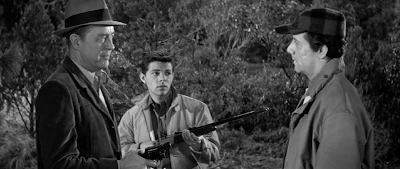

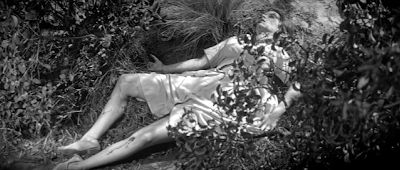

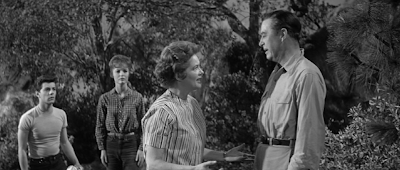




5 comments:
I enjoyed your review, and I loved how you framed it as a How To Survival Guide.
I watched most of this film some years ago when it aired on TCM, but had an appointment and missed the last 40 minutes. I've thought of this movie on and off since then, but you've got me jonesing to see the whole thing through. I'm thanking you in advance – this is such a tense and not unrealistic film.
I really enjoyed reading this. Your approach had me genuinely giggling in a few parts, which I appreciated because this does indeed sound like a film that the faint hearted best avoid! But it sounds very interesting, and I had no idea that Ray Milland ever directed anything. Thank you for contributing to our Blogathon!
Thank you for the kind comments, Silver Screenings and Palewriter! I'm glad you enjoyed the post. Thanks for hosting the blogathon, Palewriter. I hope we can do it again next year!
As you very cleverly point out, there are many lessons to be learned from this film, not the least of which is that bouncy jazz scores are ludicrously incompatible with scenes of post-apocalyptic suffering! :) I saw this many years ago, and for some reason the scene that stuck with me the most was Milland setting up a diversion to stop the steady stream of cars so that he could get his vehicle and his family on the road. You've pulled some great quotes illustrating the basic dilemma: the need to survive vs. the need to maintain your humanity and some semblance of civilization. The film is very rough and brutally realistic (in parts) for the time, and it's hard to imagine how it got funded -- it's not AIP's usual drive-in fare. And I had completely forgotten that ol' Ray himself directed. Great review!
Thanks, Brian! You described the dilemma posed by this film beautifully. Most films about nuclear war at the time focused more on the leveling of cities and effects of radiation poisoning, so this film surely must have added a new level of anxiety. I wonder if it may have played a part in people panic buying canned food during the Cuban Missile Crisis.
Post a Comment